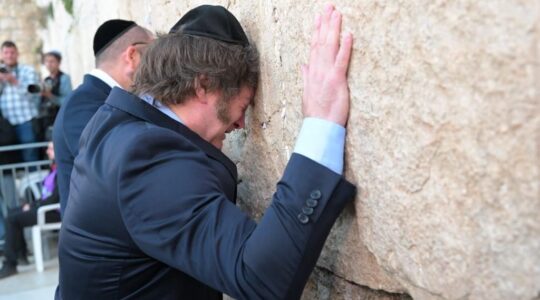
Back when the Wandering Jew was wandering, I got emails from around the world inviting me for visits. Some of them I accepted, and some I passed along to my friends. So I was thrilled to be able to direct the Wandering Jewess (remember her?) and a companion to some fine Passover fare in the Panamanian hills last month. Here’s a report from Rebecca Guber and Amy Rothberger on Passover in Panama.
——————————————–
It was obvious that we would be singing the four questions, winning the honor of youngest seder participant by nearly three decades. In many ways, it felt like a normal family affair; matzah on the table, gefilte fish on the sideboard, and excited chatter all around. As we dipped into the maror — horseradish grown nearby on the orange and coffee farm — and the tropical haroset made from local mangoes, it dawned on us that, though the text was familiar and the people around us like family, we had landed at a very unusual seder.
We were invited to join the gathered Jewish community in Boquete, Panama for the 2nd annual Seder at the home of Morton and Barbara Rabkin. Participating was a group of 15 residents, both full and part-time, all expatriates, who have created a pocket of American Judaism in a small Panamanian village, coming together to recreate the ritual meal in their adopted country. In the past, seders have been held in Boquete by Panamanian Jews, but those have ceased in recent years, and this group is committed to restarting that tradition.
Boquete is incredibly picturesque, nestled in the mountains an hour’s drive from the nearest airport, and is renowned for its perfect conditions for growing coffee and citrus.  It has clean air and temperate weather all year round — a relief from the stifling tropical heat of much of the rest of Panama. It may soon be best known in the U.S. as an ideal retirement location. At this stage in Boquete’s development, the area offers much of the infrastructure that a 60+ retired gringo would be looking for. There are estimated to be up to 3,500 expats living in the area, many of them in newer developments that look much like American suburbs, with restaurants (35 in the area), wine stores, and other services that have sprung up to cater to their needs. We heard from seder guests that they were drawn by the clean and restorative mountain air,the proximity to a Johns Hopkins-affiliated hospital in Panama City, and the opportunity for adventure. Of course, the transition is made easier by the use of the American dollar, the real estate tax exemption (until 2035, to encourage development and investment), and low prices. The perfect weather doesn’t hurt either.
It has clean air and temperate weather all year round — a relief from the stifling tropical heat of much of the rest of Panama. It may soon be best known in the U.S. as an ideal retirement location. At this stage in Boquete’s development, the area offers much of the infrastructure that a 60+ retired gringo would be looking for. There are estimated to be up to 3,500 expats living in the area, many of them in newer developments that look much like American suburbs, with restaurants (35 in the area), wine stores, and other services that have sprung up to cater to their needs. We heard from seder guests that they were drawn by the clean and restorative mountain air,the proximity to a Johns Hopkins-affiliated hospital in Panama City, and the opportunity for adventure. Of course, the transition is made easier by the use of the American dollar, the real estate tax exemption (until 2035, to encourage development and investment), and low prices. The perfect weather doesn’t hurt either.
Guests shared with us the ways that they were engaging with the local community. Mort Rabkin, a lawyer in his American life, is now a furniture maker and “the rye guy,” baking rye breads in a brick oven on his lush patio overlooking a stream. Sadly, we missed the rye, but we loved the irony that the afikoman raffle prize was a post-Passover loaf. Mort sells his bread at the so-called Gringo Market, a weekly gathering where expats sell and exchange stuff they make, supplying the community with home-made jams, artisan bread, fresh roasted coffee, and even bagels.
Besides creating an alternate community and economic system, our seder companions also described the ways the expats are trying to improve the wider Boquete area. They have established battered women’s shelters, are helping to build a library with Spanish-language books and a computer lab, and launched a recycling program. Their presence helps create jobs while infusing the area with economic activity. And though it was little discussed at the seder, we heard elsewhere that their presence has helped send real estate prices skyward and caused some tension with the native communities.

Barbara Rabkin is the acknowledged organizer of the community. After moving to Boquete a year ago, she put an ad in the English language paper looking for anyone Jewish. She knew that if there was a group of expats, and that there were bound to be some Jews, and she wanted to create some type of community in her new home. She has been gathering people together ever since. As we talked more to our hosts, we learned that this wasn’t their first run at Jewish communal involvement. They were active and involved members of their community in Cincinnati, engaged with the Federation and Rockwern Academy (formerly Yavneh Day School). We were somewhat surprised, although not too much, to learn that most of the seder guests had some kind of tie to New York City, particularly Brooklyn (we got a big cheer when we shared where we came from). Everyone was also appreciative of the Passover cookies and cakes that we smuggled into the country, straight from the depths of Brooklyn.
There is much talk about young Jews forming community that is meaningful, rejecting old ways, creating new traditions. It was inspiring to us, clearly the youngsters in the room, to find this very Jewish activity happening in such an unexpected place, and in a demographic that one would expect to be coasting in the community that they had created years earlier. These pioneering retirees decided they wanted adventure and excitement in their golden years. They still play golf and bridge, but they do so in Boquete rather than Boca.
Passover reminds us what it means to leave your home and venture to unknown lands, while preserving the traditions of our people. We are also reminded, in every generation, to think of ourselves on this journey. We are so appreciative to have had the opportunity to partake in an inter-generational Passover experience and to see ideas of migration, liberation, and tradition in a new light. As young Wandering Jewesses, engaged with the Jewish community at home, but always seeking adventure and looking to learn from the world around us, we found the residents of Boquete inspiring -– blending adventure and Jewish community. Now we can’t wait to retire.
Rebecca Guber is the director of the Six Points Fellowship for emerging Jewish artists. Amy Rothberger is an Insight Fellow, a project of the Center for Leadership Initiatives and the Charles and Lynn Schusterman Family Foundation.
JTA has documented Jewish history in real-time for over a century. Keep our journalism strong by joining us in supporting independent, award-winning reporting.





